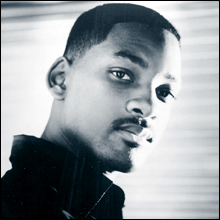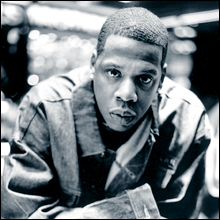![[Sidebar]](/standard/image/sidebar.gif)
![[Music Reviews]](/standard/image/headers/music_reviews_header.gif)
| clubs by night | club directory | bands in town | concerts | hot links | reviews & features |
Rap royalty
Will Smith, Dr. Dre, and Jay-Z
by Jon Caramanica
Will Smith
Will Smith, bless his non-ironic soul, is always good for those jolt-into-reality moments that too much criticism, alas, can inure you to. Twice in the past two weeks, Big Willie's taken to the small screen and demonstrated just how far rap, and he along with it, has come this decade. Or not. First, during the millennium celebration at the White House, Will burst forth with good cheer so infectious -- it was, after all, the dawn of the new Willennium -- that even the other Big Willie (Clinton, that is) was seen to be raising the roof alongside the Fresh Prince with childish, miscegenatory glee.Just 10 days later, Will dropped the toothy grin for an oddball appearance on BET's Rap City, typically the purview of artists more thuggy than he. With a gold nameplate chain dangled loosely around his neck (didn't see that one in the Vanity Fair shoot), he attempted to reclaim his post in the rap pantheon -- or, more to the point, carve one out. "Name anyone and I'll take them out," he boasted (or something to that effect). "Let's talk lyrics, flow, personality. I'll take on anyone!" The ravings of a madman, practically, but a far better clue to Will's heart than his making a race traitor of the commander-in-chief.
Respect -- is that too much to ask? I mean, four platinum albums and as many Grammys -- what more does it take? It seems that ever since Will started talking about running for president, no one takes him seriously as a rapper. Or maybe it's since he tangled with extraterrestrials in not one but two summer blockbusters. Or since he started wonking about whupping Mike Tyson's ass. Whatever the genesis, releasing albums like Willennium (Columbia) isn't helping his cause. Smith's second album as a soloist, following a lengthy ride as the warm and fuzzy Fresh Prince, sees his rapping persona stripped of all pretensions to the authenticity that he appears to crave and that other rappers wear like tattoos or easily secreted firearms. As the Fresh Prince, Will at least bore some of the traditional marks of the so-called real -- fly gear, braggadocio rhymes. All worn, of course, through a distinctly suburban, middle-class filter.
As the Rap City outburst demonstrates, however, there's the fire of a samurai lurking beneath that mild-mannered exterior. He sets out to prove it from jump, practically screaming "I'm coming! I'm coming! You can't stop me!" on the chorus to Willennium's opener. Yet what Will apparently fails to grasp is that in every braggart lies a heart of insecurity -- it's easier to side with someone whose confidence is earned through battle scars. When Will raps about his Bentley, it sounds more like a privilege than a luxury. "Heard you screaming about cream in your rap, kid," he taunts on "Freakin' It," slaying with the proclamation, "Yo, my last check for Wild Wild West came on a flatbed." Maybe he's just indignant, but he's looking for love in all the wrong places.
Dr. Dre, on the other hand, stopped looking for love long ago. Since the critical and commercial success of his 1992 solo debut, The Chronic (Death Row/Interscope), which is widely regarded as one of the most influential albums of the decade, Dre has all but disappeared from the hip-hop world, save for producing high-profile upstarts Snoop Doggy Dogg and Eminem, flirting with criminal charges, and completing an extended dance with Death Row mogul Suge Knight (now incarcerated) to free himself from the label. He achieved a comeback of sorts with 1996's "Been There, Done That," a track disowning his gangster past, but it's only now, with the release of the long-awaited Dr. Dre 2001, that he's truly taking another stab at the limelight.
Unlike Will Smith, who lets his seething resentment seep out only in controlled bursts, Dre takes a far less forgiving position towards his detractors, aiming practically the entirety of his new album in their direction. Entertainment hath no fury, it seems, like a rapper scorned. In fact, he's so heated, he's got his two protégés doing the insulting along with him on Dr. Dre 2001's two lead singles. "Still D.R.E." and "Forgot About Dre" are fundamentally the same song, manifestos for the reascendance of the superproducer in the face of excessive player hatred. "Still waters run deep," Snoop Dogg warns at the outset of the first, and Eminem, wisely put on chorus duty in the second, expresses surprise, nay anger, that "motherfuckers act like they forgot about Dre."
Yet it's Dre himself, apparently still unwizened after years of idling, who spits the hottest fire. "Haters say Dre fell off/How nigga? My last album was The Chronic," he reminds us. Nevertheless, Dre knows he still has to talk the G game -- "Still puffin my leafs/Still fuck with the beats/Still not loving police/Still rock my khakis with a cuff and a crease" -- in order to be taken seriously. Been there, done that -- sure, but familiarity is a cozy sweater. In the interviews Dre gave to promote this album, he was often heard talking about the conscious decision he made to revisit his misogynistic, gun-toting (lyrical) tendencies. Even his wife got in on the bitchslapping act, telling Entertainment Weekly that it was she who'd told him that his music was missing the fire of The Chronic and that he should bring the "bitches" back.
Jay-Z
The violence is back too, if it ever left at all. "Now you wanna run around and talk about guns like I ain't got none/What you think, I sold em all?" Maybe if he needed the money, he would have, but it should be said that Dre has avoided the fiscal calamities of most rappers who achieve the astronomical financial success he did. Even parting ways with Suge Knight didn't leave him high and dry and hanging on for dear life on a hotel balcony. So you'll allow Dre a bit of bitterness toward the game that chose to chew him up anyway. In perhaps the best player-hater-hating line in recent memory, he smashes the proverbial guitar and stomps off stage: "This is the millennium of Aftermath/And ain't gonna be nothing after that/So give me one more platinum plaque and fuck rap/You can have it back."Dre's vitriol is palpable, but, in one of those sticky exchanges of the new rap capitalism, it seems unlikely that Dre himself wrote many of his lyrics on Dr. Dre 2001 (Aftermath/Interscope). A close listen to cadences finds his pacing far closer to that of Eminem than to the plodding Dre of old, though of course any such contributions are uncredited. Yet on the statement of purpose "Still D.R.E.," it's a credited Jay-Z who pens Dre's darts. Over the past few years, Jigga's seen a steady stream of side income from ghostwriting -- "I get paid a lot of money to not tell you who I write for," he joked to Vibe. The Dre gig is certainly his highest-profile to date, but it's also, apparently, the cause of some controversy in the Dre camp.
Living the lavish lifestyle that Jay does, it was difficult for him to grasp Dre's sense of entitlement, his anger at not receiving his due. The first draft of "Still D.R.E." was a jiggy Jigga classic, replete with shiny cars and expensive champagne. Yet though it may well be Dre Day, the celebration was premature and ill-placed. Dre allegedly sent it back for a rewrite, and only then did the song come out as it stands now
You'll forgive Jigga his confusion. Success has come remarkably easily in his world, and swarms of detractors have yet to encircle him and try to pull him down. His own latest manifesto, Vol. 3 . . . Life and Times of S. Carter (Roc-a-fella/Def Jam), is a tale of the criminal-mastermind elite unblemished by even a smidgen of doubt. "Think Jigga's a joke, nigga? Har-de-har," he jests on "So Ghetto," just one of many tracks where he's so bold as to be indifferent, or at least impervious, to criticism. Whereas Dre seems to be taking things far too seriously and Big Willie's gravity is worn so comically it's almost believable, Jay's the arrogant one of the trio -- the one with the most bling bling to lose. Yet in his mindframe, such a descent is impossible. "The game is ours/We'll never foul out," he proclaims on "Do It Again," the first single. And whereas Dre foresees a clanking exit from the game, flipping off critics on the way, Jigga knows to go out on top, finishing the boast with the admonition "Y'all just better hope we gracefully bow out."
Of course, getting arrested and dragged through the page 6 gossip muck for allegedly stabbing record exec Lance "Un" Rivera last month at Q-Tip's album-release party is hardly the way to "gracefully bow out." Yet somehow Jigga's managed to keep a low profile and still tend to business, touring the country to promote his album while waiting for his court date at the end of this month. If he's sweating, he certainly ain't showing it. "Thug nigga 'til the end, tell a friend," he smirks on "So Ghetto" -- no compromises, it seems. In the video for "Do It Again," Jay snickers rather than raising the roof with the rest of the clubgoers; the doo-rag rocker knows it's all one big joke of a hustle anyway: "We tote guns to the Grammys, pop bottles on the White House lawn. Guess I'm just the same ol' Shawn."
| home page | what's new | search | about the phoenix | feedback |
Copyright © 2000 The Phoenix Media/Communications Group. All rights reserved.

